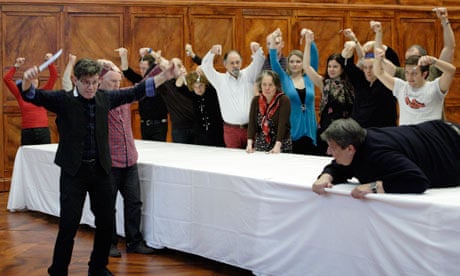"In a way, Falstaff is the most English of pieces," explains the opera director Robert Carsen. "But at the same time it is also the most Italian." The fruitful combination of Verdi/Shakespeare and of England/Italy are at the very heart of the work and routinely inform any staging of it, but in his new production Carsen faces an additional Anglo-Italian variant that is potentially more problematic: La Scala/Covent Garden. His Falstaff opens in London next week in a co-production that will be seen in Milan next year as part of a season celebrating the bicentenary of Verdi's birth.
"Falstaff had its world premiere at La Scala," Carsen says, "so in that sense we're taking coals to Newcastle. But the relationship between Italy and England feels a very natural one. Walk around Milan and everywhere there are Italian gentlemen dressed in a completely English manner, with the suits and the shoes and the rest of it. But somehow it doesn't come out as completely English when they put them on. It comes out in an Italian way, and the opera is the same. You don't have to Italianise it for the English, or anglicise it for the Italians. It just comes out that way when you do it properly."
The Canadian director began his opera career as an assistant at Glyndebourne over 30 years ago and in recent years has returned to the UK to work at both Glyndebourne and the ENO, but much of the interim was spent working all over Europe and in north America. He has directed many co-productions but says that more usually they have been for less well-known operas, "rarities that a theatre would only want to stage every 50 years and therefore wanted to share the costs. But now, with the financial challenges that are facing opera companies everywhere, it appears likely that standard repertory pieces will be shared. But what doesn't change, no matter what budget fights take place behind the scenes, is that the audience wants to see as much of the ticket price as possible on the stage. An investment in an opera ticket is not just for an evening, it's something you hope will stay with you for a long time. So I was very aware that the production had to work equally well in both London and Milan and also in Canada, where it will go in 2014."
He describes Falstaff as "the most action-packed thing I've ever come across. It never stops. How Boito has condensed three Shakespeare plays into such a brilliant libretto is remarkable. How Verdi invests the music with such energy, bubbling continuously before breaking into the crazy bits, is real genius. You have to get in all the comedy as well as making sure the autumnal and slightly more melancholy bits work as well. It's a dream to direct."
The social thrust of his early 1950s England-set production focuses on the rising middle class of the Fords contrasted with Falstaff's declining aristocracy, as well as acknowledging that this is a set of mostly middle-aged characters pitted against an emerging youth culture. There's also some hunting – "Falstaff truffles all of his speeches with hunting and chasing and horses, as well as men chasing women and all that" – and of course plenty of food and drink. "He is such a sunny character that even when his bubble is completely burst, it just takes one cup of hot wine for the sun to come out again. I love that amazing section when he describes what it is like to be tipsy, what it feels like when the wine starts to make its way through your bloodstream."
Carsen says it was "never an option" to set the work in Elizabethan times. "It would be like doing it in fancy dress. I'm interested in clothes rather than costumes. This is a social comedy, maybe the social comedy. You could also almost describe it as the first musical comedy. The aria is one of the things opera does so well, reflective soliloquies when the actor takes a moment. But there is nothing like that in Falstaff. It is all action and interaction, so each scene grows in hilarity with the music taking each scene to climaxes you wouldn't have thought possible."
He says the comedy will inevitably emerge in subtly different ways in London and Milan. "The Italians just do it differently. The tonality is ever so slightly their own. But ultimately my philosophy is to show respect for the piece and to trust it. To make this Falstaff as much like Falstaff as it can possibly be. As joyous, as generous, as funny and as emotional. The reason why opera, when it really works, is greater than any other art form is that it satisfies the head and the heart equally. The balance might change depending on the composer and librettist. It is not the same in a Rossini comedy as in Strauss's Elektra. But the head and the heart must be in some kind of tension. A dry, intellectual reading, no matter how brilliant the ideas, will leave you coming away frustrated in the same way that just a wash of emotion will.
"The miracle happens when everything comes together: head and heart, singers and orchestra, technicians and producers all creating this ephemeral thing which as soon as it is completed no longer exists – the performance. And that, in a sense, is something that makes things easier for us. It remains exactly the same whether you are working at Covent Garden or La Scala or anywhere else."

Comments (…)
Sign in or create your Guardian account to join the discussion